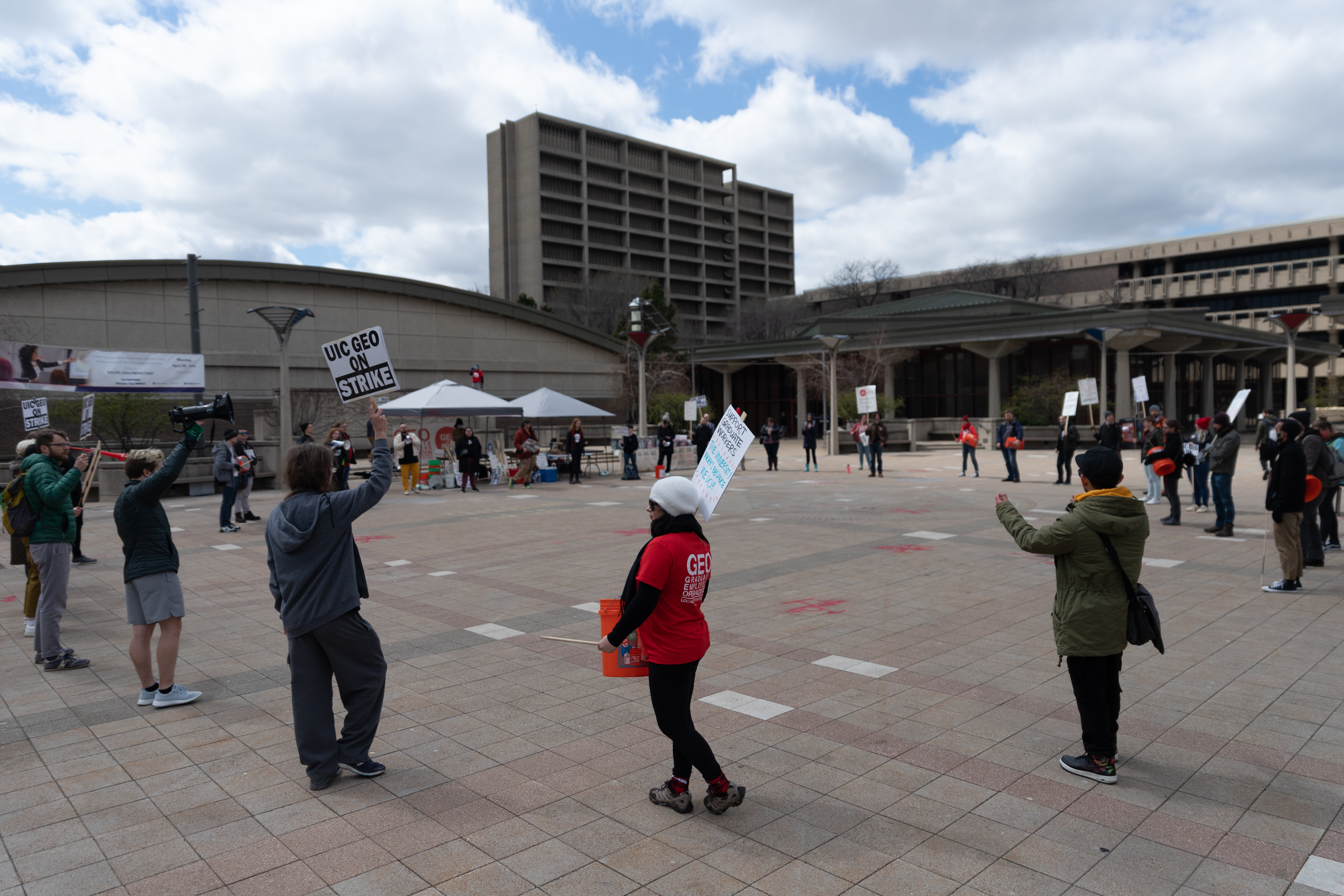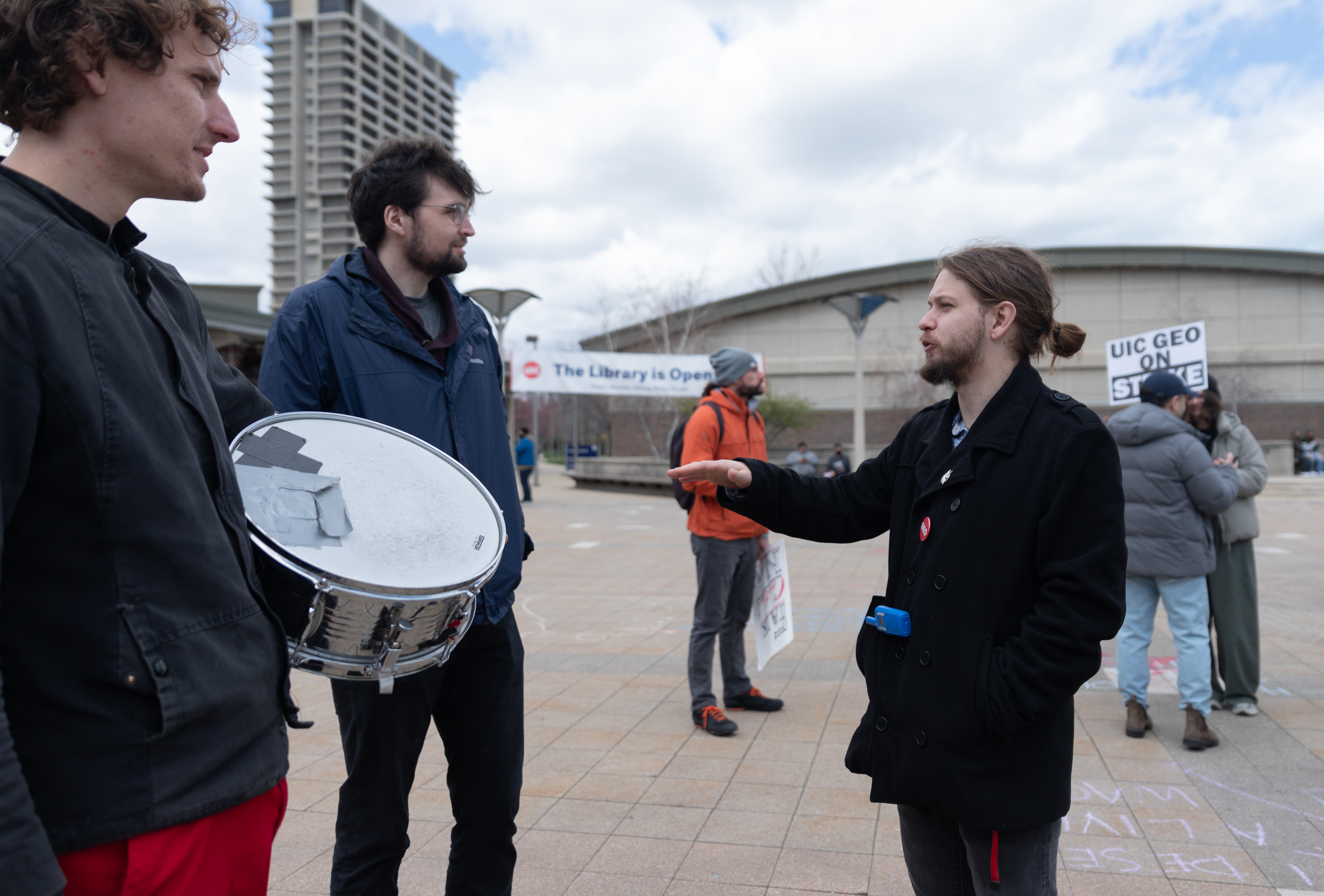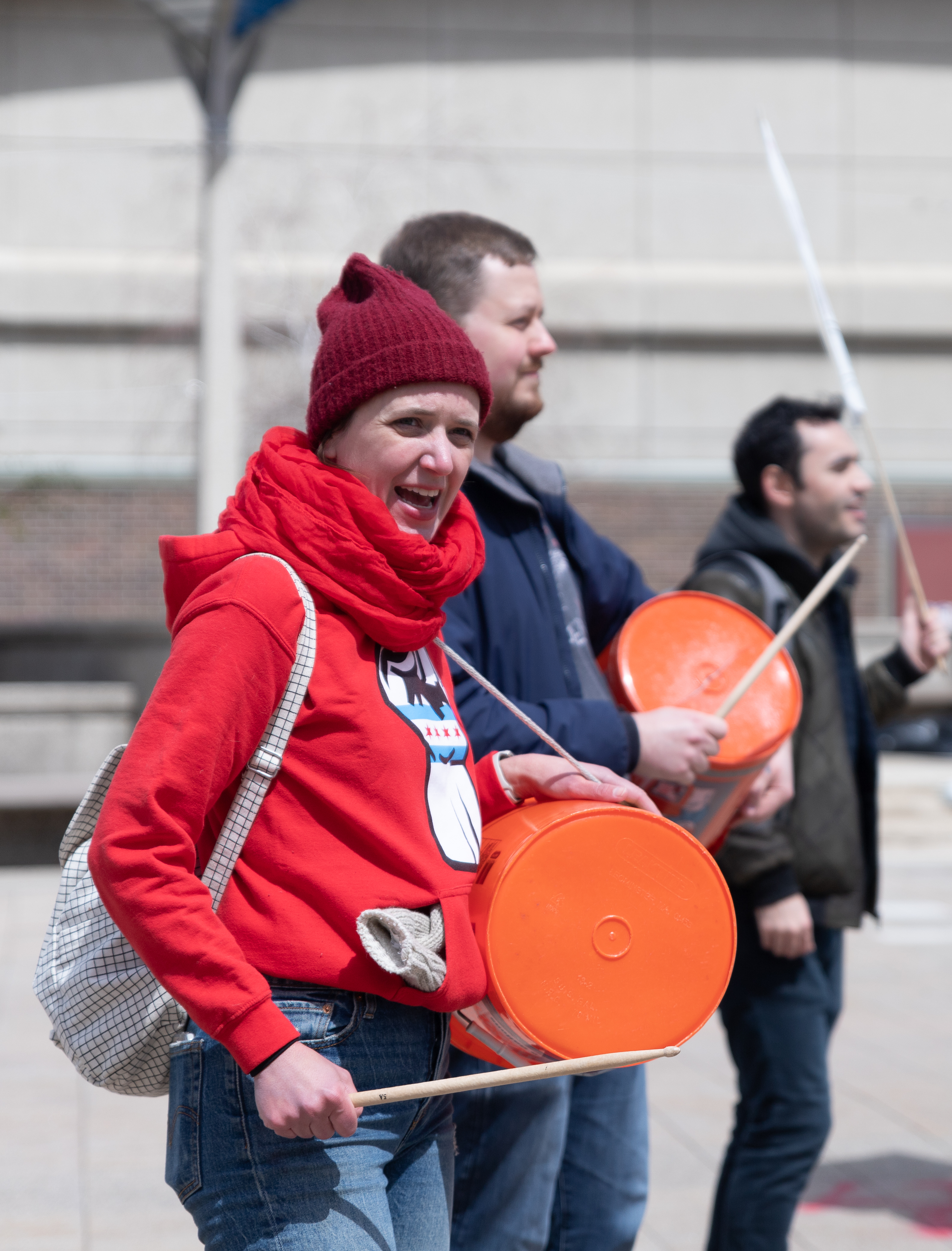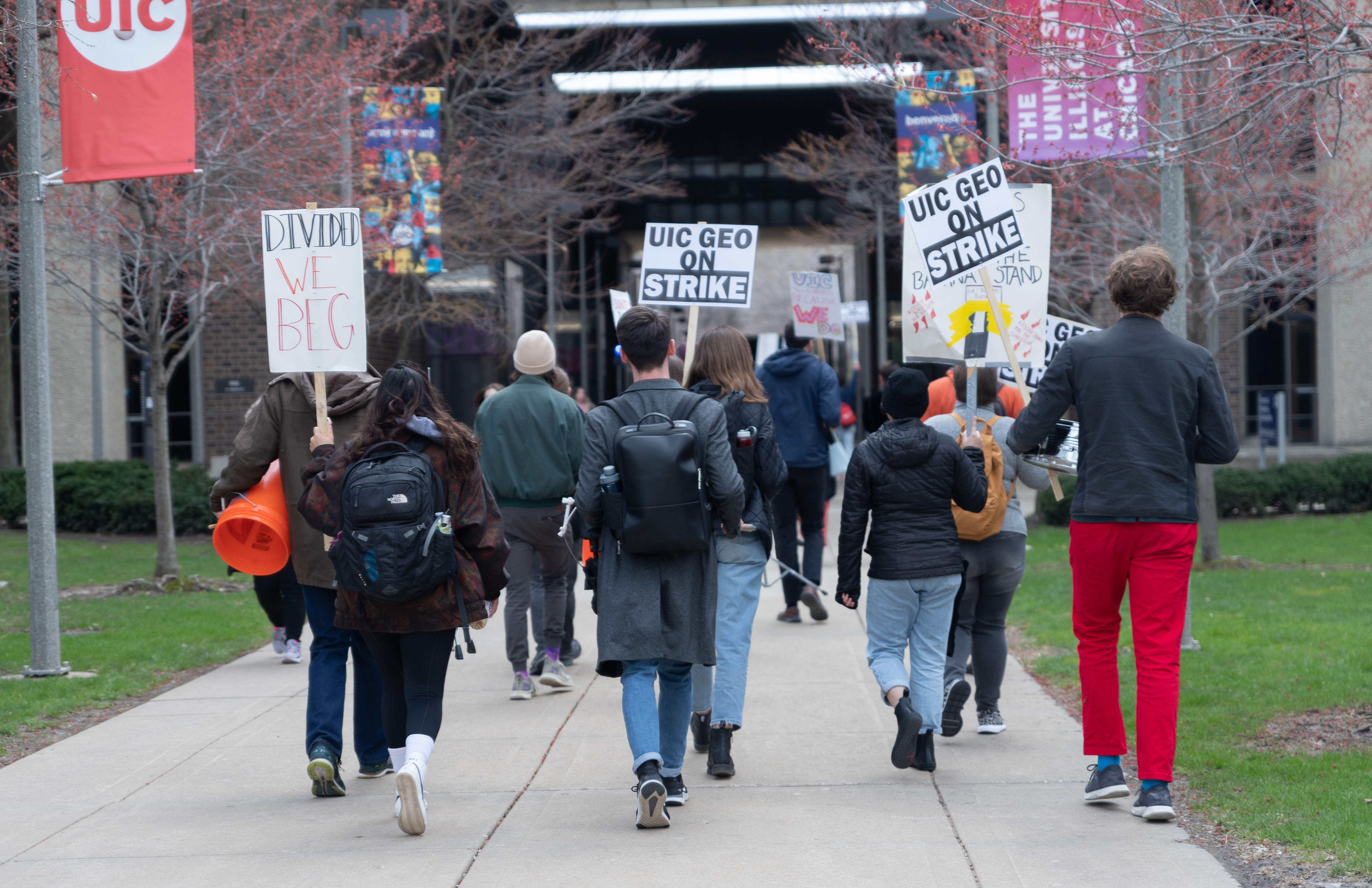“There’s a real lack of awareness from some of the folks who are on the university bargaining team, about the emotional and the social aspects of being a professor and like being a TA, and being there and showing up for your students.”
After a year of unsuccessful contract bargaining, the Graduate Employees Organization at the University of Illinois Chicago, GEO Local 6297, went on strike this week. Since Monday, over 1,500 graduate assistants and teaching assistants have stopped lecturing, grading and working with students. Many have been picketing throughout UIC’s campus with signs, buckets, noisemakers, megaphones and more all week. This is the second contract cycle in a row where GEO has gone on strike, with the last strike happening in 2019.
“What caused us to go on strike is the fact that [university administration] just have not been taking bargaining seriously,” GEO’s Organizing Chair Matt DeVilbiss said. “[University administration] demonstrated that they do not recognize the value of our work. And so, this is basically the ultimate way to show them what that value is.”

GEO strikers gather in a circle on the UIC quad where they sing the union anthem, Solidarity Forever. The strike began on March 18 after failed contract negotiations with the university. Photo by Emily Soto, 14 East.
GEO’s frustrations with bargaining led GEO’s steering committee to email members in March calling for a vote to authorize a strike. On April 1, 97% of voting members voted to authorize a strike.
UIC’s GEO is not the only Chicago university with a graduate student union, and not the only graduate student union to strike in recent years. The University of Chicago’s Graduate Students United went on strike in 2019, just months after GEO’s 2019 strike, demanding that the university recognize the union. Graduate student workers at Loyola University and Northwestern University are also unionized however, at DePaul, graduate assistants are not unionized.
As the final week of classes approaches at UIC, the university is under pressure to negotiate the contract so GAs and TAs can return to work to finish grading by the end of the semester.
“I have to sit out here in the cold instead of meeting with students, instead of helping them finish their final projects, making sure that they feel capable of succeeding,” said Meg Rock, GEO’s chief steward and a 2nd-year PhD candidate in UIC’s college of education. “That’s what I want to be doing. And until we have a fair contract, and my comrades and I are supported, we can’t do it, like we can’t help our students.”

Matt DeVilbiss (right), Geo’s organizing Chair, directs picket leaders before the strike. Photo by Emily Soto, 14 East
Current Negotiations
There are still five articles in the contract up for negotiation which GEO and UIC’s bargaining team have largely disagreed on throughout the bargaining process.
This is where bargaining is as of Wednesday, April 20:
No Strike/No Lockout
The university is bargaining for the right to potentially lock GAs and TAs out of offices, classrooms, labs, emails and more if workers were to go on strike in the future. A “no strike/no lockout clause” is common in most contracts, and it protects workers from getting locked out of their email, office and other work materials in the event of a strike. A lockout would be difficult for UIC to enforce as most graduate workers use classrooms, emails, Zoom logins and other resources as both students and workers.
“[A lockout] is not going to work if they [UIC] try and enforce it,” said Rock. “Would [UIC] lock us out of our UIC Zooms because I use my Zoom as both an instructor and as a student?”
Wages
Wages have been a primary point of contention in the bargaining process. According to a statement from UIC, the university has proposed a 12% raise over a three-year contract with an 8% raise in the first year and 2% raises in the next two years, as well as a $1,000 one-time payment. The union’s bargaining updates from April 19 said that the one-time payment is a $150 increase and that the university proposed a four-year contract with no raise in the first year. UIC Graduate assistants receive a stipend of $20,615 per nine months working 20 hours per week on average.
Fees
GEO asked for full student fee elimination but eventually moved to request a 90% reduction of tuition deferrals, a fee reduction for UIC’s student health benefits program CampusCare, a $100 cap on the General Fee and elimination of the International Fee. UIC’s bargaining team has offered no additional fee relief according to GEO’s bargaining updates this month. However, the university decreased CampusCare costs for secondary dependents which include parents, parents-in-law, step-parents and those who stood in place of a parent.
“We already don’t get paid much,” said Jennifer Vaccaro, a TA for the Department of Mathematics, Statistics and Computer Science. “And now, we have to give a lot of that back to the university.” Fees make up 10% of grad workers’ income, and are taken out of the first paycheck of each semester.
Non-Discrimination & Anti-Harassment
After many negotiations about the language around workplace bullying and accommodations, UIC and GEO have almost agreed. However, the union asked to eliminate mandated reporting and instead implement a new procedure where reporting to Title IX is not mandated for certain employees. Rather, a victim can confide in anyone at the university and decide to file a report through Title IX or elsewhere.
Eight-Week Courses
UIC’s eight-week courses are taught by TAs, but, “Over the past year, two colleges on campus started online degree programs that use eight-week online courses. These colleges gave the teaching assistant duties of these eight-week courses to third-party subcontractors called ‘academic coaches,’” according to GEO’s April bargaining updates. In an effort to protect grad worker jobs, GEO has proposed that TA work for those courses be done by TAs rather than the academic coaches. The proposal was rejected earlier this month, and UIC’s bargaining team has yet to respond to GEO’s revised language.

Workers formed picket lines and walked around the UIC campus. They shouted, “UIC, increase our pay,” and many other chants. Photo by Emily Soto, 14 East.
The Past Year
Bargaining began on April 13, 2021, and after 34 bargaining sessions between GEO and UIC’s bargaining team, no resolution has been reached. However, the contract negotiated in 2019 ended on August 15. TAs and GAs have been without a contract for the entire school year.
A federal mediator was brought in March 10 and has been mediating sessions since then.
The two parties bargained twice this week, on Tuesday and Wednesday afternoon. According to the bargaining updates page on GEO’s website, the university passed a package proposal to the union on Tuesday that looked similar to their past package proposals. GEO said “nothing was settled” during Wednesday’s bargaining session.
Bargaining just wrapped. Nothing was settled, the university made little movement. We’re still on strike.
— UIC GEO (@uicgeo) April 21, 2022
Over the 34 bargaining sessions, the GEO and UIC’s bargaining team have negotiated agreements about employee discipline and dismissal, six weeks of parental leave, five days of sick leave and additional bereavement leave, and a task force of students and administrators to assess the implementation of nine-month appointments rather than the current semester-long appointments.
Strike impact on the university
Despite the work stoppage of over 1,500 graduate workers, UIC Chancellor Michael D. Amirridis and Provost and Vice Chancellor of Academic Affairs Javier Reyes announced last Friday that UIC would continue “normal operations.” Meaning, many undergraduate students are without instructors and graded work as the end of the semester approaches quickly.
For Rock, who teaches 35 undergraduate education students who will soon be searching for student-teaching experiences, this work stoppage is difficult.
“It was really devastating Sunday night to send an email to 35 undergraduates who I’ve come to know, and say, ‘It’s been really wonderful to learn with you and from you. I hope I see you by the end of the semester,” they said.
The response from undergraduate students, however, has been in support of the union’s efforts.
“None of the undergraduates we’ve spoken with have been upset with us,” Rock said. Chief Organizer DeVilbiss said over 1,000 undergraduate students sent emails to UIC administration on the union’s behalf.
“I think that, by and large, the undergraduates recognize that it’s on the administration to resolve this, that we can’t be expected to continue … working under an unfair contract,” DeVilbiss said.
Next week is the last week of classes before finals week at UIC. If the strike is not resolved by then, the repercussions could be catastrophic for the end of the year.
“It’ll be an absolute disaster for the university if they don’t come to an agreement by finals time because then finals won’t get graded and students will get incompletes,” DeVilbiss said. UIC administration has not made any comments about finals week or the end of the semester.

A GEO striker hits a bucket along to chants in the UIC quad. Photo by Emily Soto, 14 East
2019 Strike to today
This is not the first time GEO voted to strike after failed contract negotiations with the university. It was in 2019, when DeVilbiss, along with other GA’s and TA’s, first formed picket lines around the UIC campus. University operations were halted and classes were canceled.
Back then they were also fighting for better wages and fee reductions.
GEO had the support of outside organizations, like the Chicago Symphony Orchestra, who were also striking at the time. They gathered a large group that met on the university quad and that year, DeVilbiss was a picket line leader.
After nearly three weeks of the strike, the university provost sat down with the union and they were able to come to an agreement. They won the biggest raise that the union had ever seen — 14% over the three year contract — and the General Fee would be limited. Any new fees created after the contract would be waived.
“I remember being just amazed that we could stand up for ourselves and actually, you know, take action and force the university to compromise, even though it is obviously in their interest to pay us as little as possible — and they will do that,” DeVilbiss said. “We’re not begging, we’re demanding.”
While the crowd is not as large this time, the fight is still as important. There is a two-to-one ratio of full-time faculty to GEO workers but GEO workers often work directly with undergraduate students.
“We’re the ones that talk to students,” Vaccaro said. “We’re the ones who, students know our names. Students asked me for letters of recommendation, not their professors because I know their work better, I’m the one that works with them … They tell me about the stuff that was confusing to them in their lectures, they would never ask those questions to the professors. We’re the people they trust. We’re the people who make the education at UIC possible.”
How will the strike come to an end?
“The strike is indefinite … until we receive a fair contract,” according to DeVilbiss.
The end of the semester is just two weeks away, meaning graduate workers will also be responsible for completing their coursework as students even if the strike continues.
“It is a very radicalizing experience, to see how we are talked to, how our work is devalued,” Rock said. “And there’s a real lack of awareness from some of the folks who are on the university bargaining team, about the emotional and social aspects of being a professor and like being a TA, and being there and showing up for your students.”

The strikers walk by the Science and Engineering Labs as they begin the second round of pickets in the afternoon. Photo by Emily Soto, 14 East
No new bargaining sessions have been announced as of Thursday night. Bargaining updates can be found on GEO’s bargaining updates page and UIC’s GEO bargaining website. Recent strike updates can be found on Twitter @uicgeo.
Header Image by Emily Soto




NO COMMENT